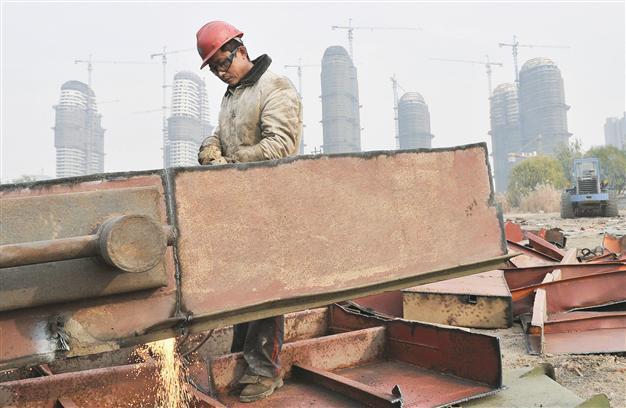China’s home prices increase, but signs emerge of slowdown ahead
BEIJING - Reuters

Ordinary Chinese people in most cities face home prices that are well beyond their reach, adding the threat of social unrest to that of a housing bubble, urging the government to take tough measures. REUTERS photo
China’s home prices rose at the quickest annual pace on record in November, but signs emerged that the government’s four-year effort to cool the market may be starting to bear fruit as monthly gains marked the slowest this year.
House prices in China have surged in the past year, in part due to a view that property remains one of the best investments, prompting the government to introduce targeted measures aimed at restraining the market without damaging one of the pillars of growth in a slowing economy.
Those measures have started to bite, with yesterday’s data showing that monthly price gains in November were the slowest this year, pointing to a moderation in rises in the coming months.
“The headline figure is quite alarming, though it’s not really new and there’s been such high growth in the past mainly due to the low base and rapid growth in the beginning of this year,” said Alfred Lau, property analyst at Bank of Communications International in Hong Kong.
“The government also sees that. So that’s why you see some tightening measures, especially on mortgages. That also explains the slow growth in November. We expect the momentum will moderate going forward.”
However, ordinary Chinese in most cities still face home prices that are well beyond their reach, adding the threat of social unrest to that of a bubble, and Lau noted that the government may impose more curbs if prices continued to rise.
The hot housing market has provided a tricky challenge for policy makers who are trying to steer the world’s second-largest economy towards more sustainable growth after three decades of breakneck expansion.
Analysts say Beijing won’t want to see a sudden and sharp downturn in property because of its importance to growth. The economy is set to grow this year at about 7.5 percent, the weakest pace since the Asia financial crisis in the late 1990s.
Average new home prices in China’s 70 major cities in November rose 9.9 percent from a year earlier, according to Reuters calculations based on National Bureau of Statistics data published on Wednesday, the fastest pace since records began in 2011.
But prices rose 0.5 percent in November in month-on-month terms, the data showed, slowing from October’s rise of 0.6 percent and the third straight slowdown since August’s 0.8 percent gain.
Monthly gains had topped 1 percent earlier in the year. For a full table, see.
Slowdown aheadA Reuters poll in November had also predicted a slowdown in house price growth, with analysts forecasting a 5.0 percent rise in house prices next year after a 10 percent gain this year.
They cited relatively tight credit control and government curbs for the slower pace of growth. Those measures have included raising minimum downpayments for second homes and promising more land for building.
Official data on Dec. 10 showed total land area bought by developers rose 9.9 percent in the first 11 months of 2013 from a year earlier, reversing from a drop of 3.6 percent in the first 10 months.
Developers see increased land as contributing to easing home prices gains next year.
“The increased land supply this year means there will be more home supply next year,” Ren Zhiqiang, president of Hua Yuan Property Company told a forum on Monday.
“History has told us that every time when there was a rapid growth of land supply, it would turn into easing home price gains.”
